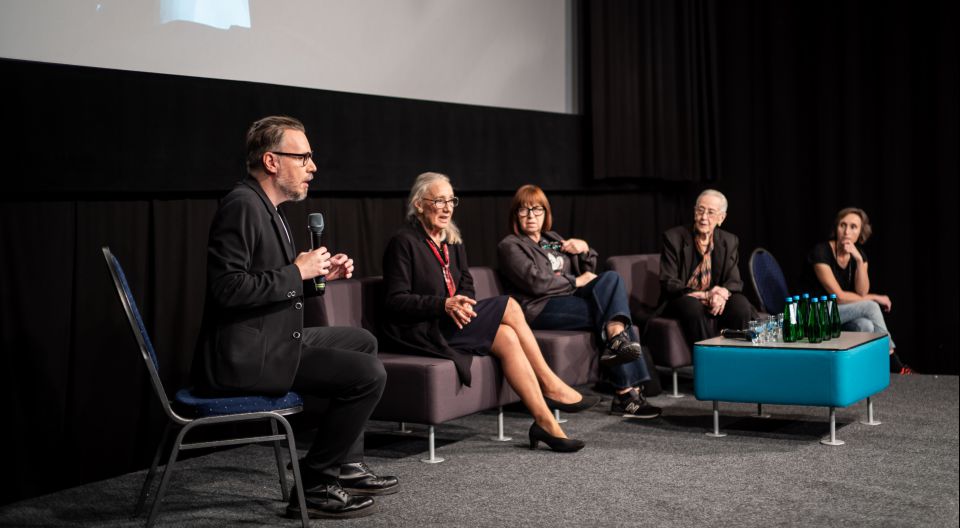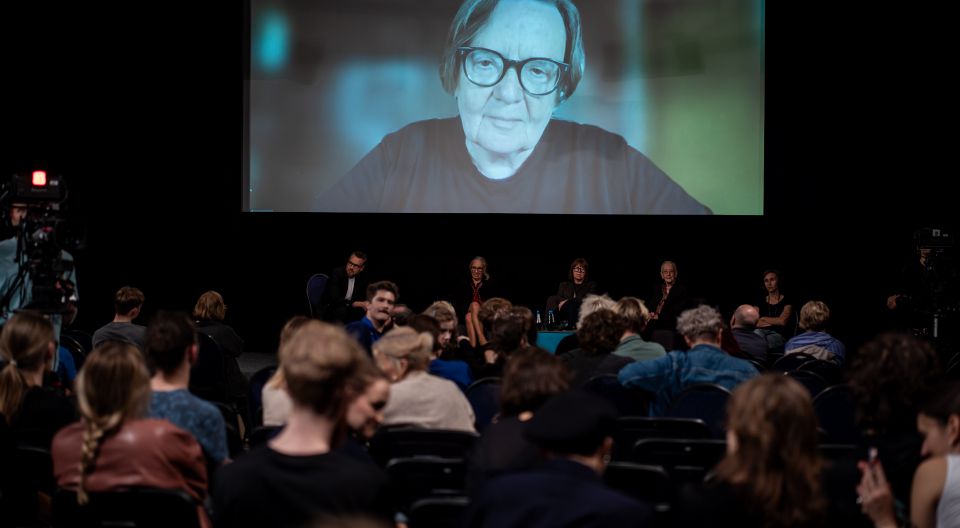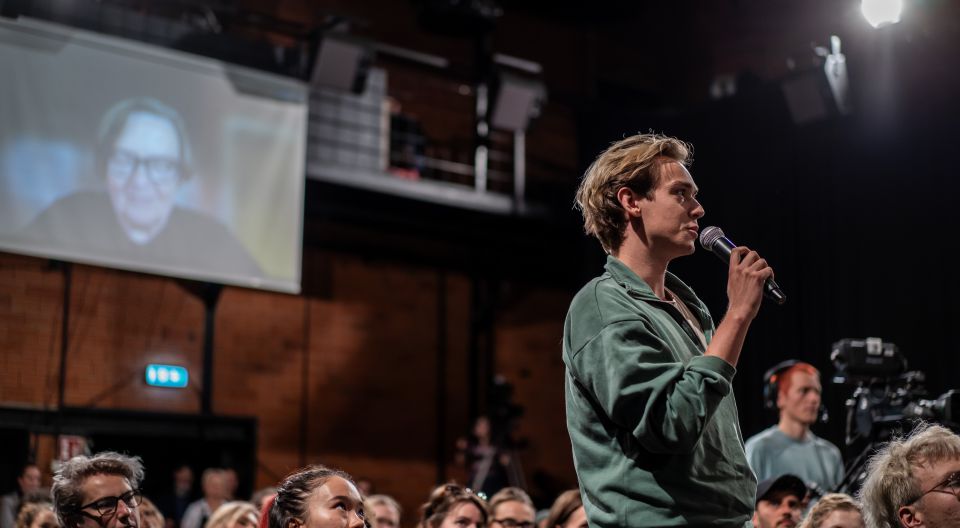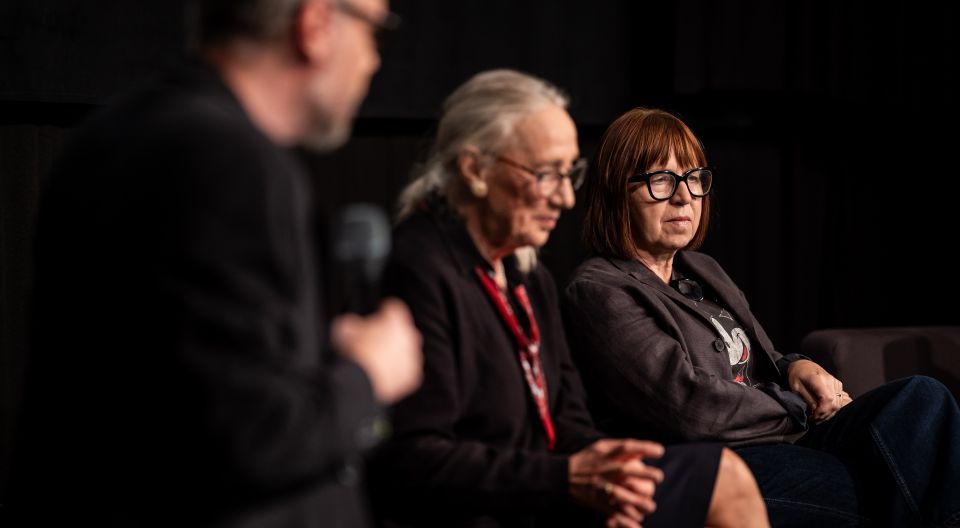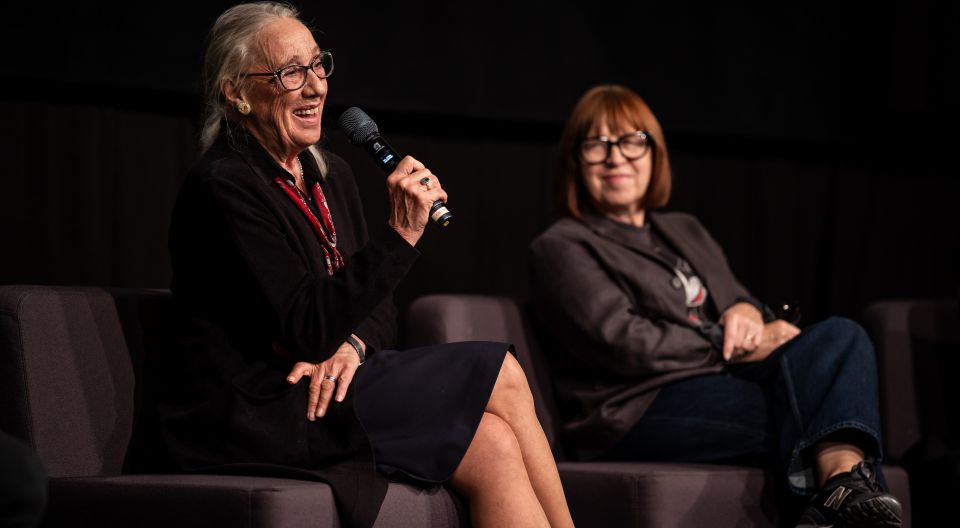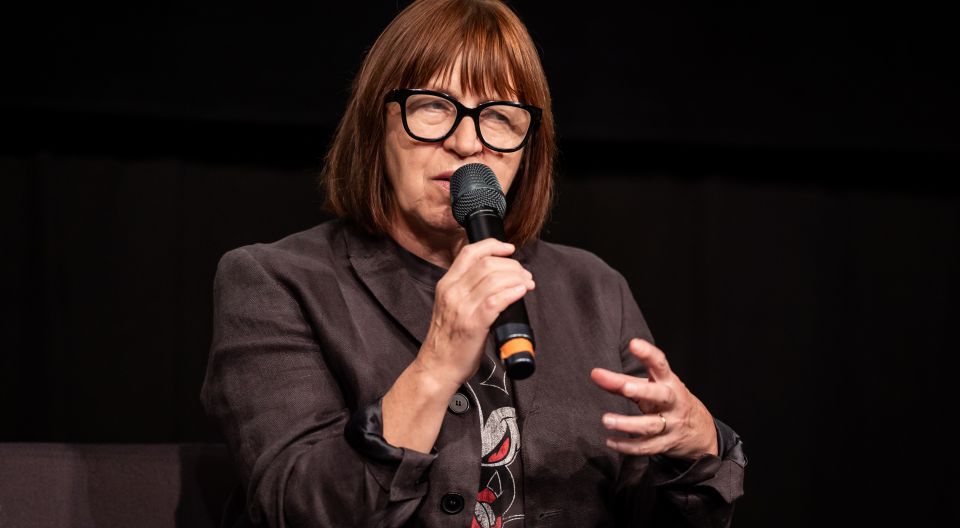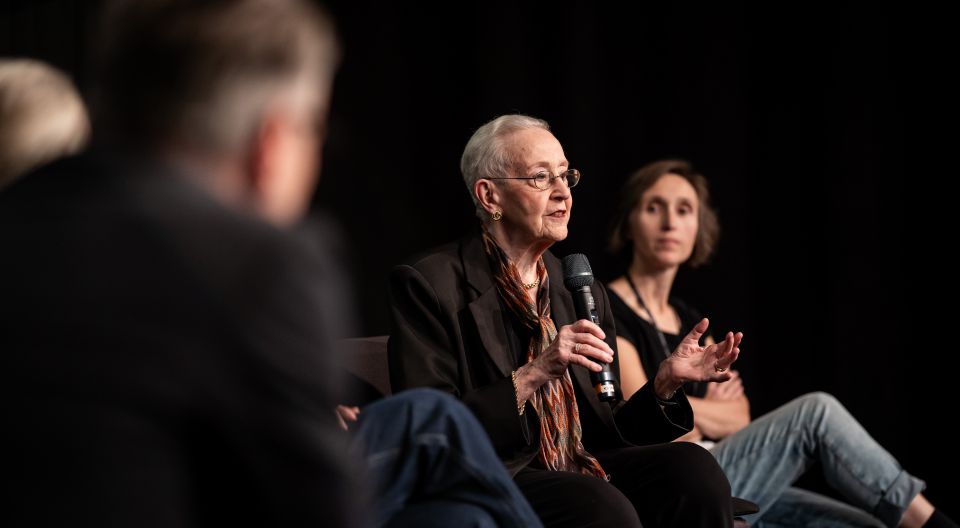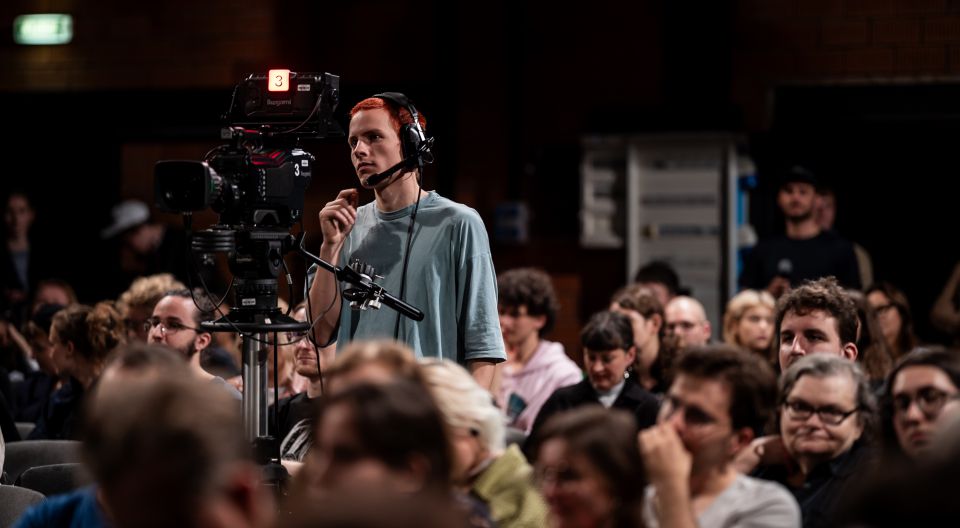14.
10.
2023.
Others
Others
DHC recipients: Agnieszka Holland, Maja Komorowska, Ewa Puszczyńska and Ewa Rubinstein met with students and talked about courage, concentration on details, and the power of femininity.
Maja Komorowska, Ewa Puszczyńska and Ewa Rubinstein participated in the meeting in person, while Agnieszka Holland connected online. The meeting was hosted by Kuba Mikurda.
Due to the fact that it was a meeting with students at the film school, the first question concerned artistic education and its contribution to later professional career.
Agnieszka Holland stated that in her student days - in the 1960s - there was no other option to enter the profession. However, she summed up her studies as an extraordinary stage which, on the one hand, teaches technical skills, but on the other hand opens up prospects for meeting passionate people. It teaches how to work with them and how to look for authenticity in a story. "You can't buy this kind of time anywhere else," said Agnieszka, "School should give you confidence in yourself and faith in cinema."
Maja Komorowska, in turn, talked about her own experiences at theatre school. “I think this time is given to learn mindfulness. (…) To take a closer look at what is happening around you and what is happening within you, and to be able to talk about it. And not lose hope and faith that you want to speak up. School can't kill the desire! Then, Maja Komorowska turned to Agnieszka Holland: "Yesterday [on the day of awarding honorary doctorates - note. [ed.] it was a surprise that you were not there, and today it is a surprise that you are here!”
A different approach was presented by Ewa Puszczyńska. The producer talked about the great need for project work during studies, thanks to which students have the opportunity to work together, in a structure and group, and learn from each other. "I think that even "non-artists" will be artists in their profession and will support artists in narrating important films that teach mindfulness, which Maja talked about."
Ewa Rubinstein mentioned her two visits to the Lodz Film School in 1986 and 1987. “Back then, directing students didn't want to hear about photography at all. At the school library there was one book on photography and maybe three or four Japanese magazines and nothing else. When I went back to New York, I tried to collect books so that when I came back to Lodz I would have be something to show and discuss.”
Due to the limited time of the online connection, there were numerous congratulations for the film "The Green Border" and questions addressed directly to Agnieszka Holland. Students and lecturers asked about cooperation with Polish and foreign actors, the courage that accompanies the director, cooperation with young directors - Kamila Tarabura and Katarzyna Warzecha, as well as about the internal directions and tensions which lead the director to directing a film:
“Some films were born out of curiosity – the desire to encounter the subject matter, a form or reality. (...) And it was necessary for a certain kind of curiosity to be triggered, a feeling that I must and would like to tell something and face it. However, other films, such as "The Green Border", were an imperative, and this is something else (...).
Holland recalled her student memories: 'He taught me the most, he was a very short man, even shorter than me, a professor who taught television directing. He told us about how to cooperate with people, when a director can agree to make concessions and when he cannot (...). Such various psychological tricks, which were probably the most useful to me out of all these teachings!”
The director talked about the mechanisms which influence the financing of film production and, consequently, artistic expression. "There are fewer and fewer films that are truly brave!" Energy, curiosity, patience - according to Agnieszka Holland, these are the features necessary to show the world through images and sounds.
There was also a question about women functioning in the world of art - did being a woman influence the careers of our DHC recipients?
“For a very long time it seemed to me that it didn't matter (...). Only when I got to the West did I realize that it was unwise (...). It's much, much harder for us women. And even if we achieve some great results and make a great film, we actually go back to square one every time and then we have to continue to prove that we have the right to do it!” - said Agnieszka Holland.
Maja Komorowska admitted that she was lucky and curious to play several male roles in her life and she recalled Beckett's quote saying "gender is added at the end". However, the actress admitted that the fact of giving birth to a child had an impact on her personality, especially her artistic one.
Ewa Puszczyńska mentioned not only to women's biological but also psychological characteristics: "I think we are more patient, I think we have greater stress tolerance and we are more open to dialogue (...). Our ego is usually very small or non-existent. We devote ourselves completely to what we do.”
In turn, Ewa Rubinstein talked about entering a profession that was originally considered strictly male and admitted that, in her opinion, there is no gender division in sensitivity: "For me it is simply a feeling, a thought and a reaction to reality."
During the long, warm and friendly conversation between the DHC recipients and the School community, questions were asked about artistic work methods, focus on details that build the whole and the search for the truth which hides behind a deep meaning. And also about artistic inspirations that push you to do what you want to achieve and allow you to avoid what is definitely not worth doing. Expressions of gratitude, congratulations and appreciation flowed from and to the stage.
The presence of the extraordinary guests was rewarded with a round of applause. The four excellent artists joined the group of Doctor Honoris Causa recipients’, the degree granted by the Lodz Film School, which includes: Jerzy Toeplitz, Andrzej Wajda, Roman Polański, Jerzy Kawalerowicz, Wojciech Jerzy Has, Vittorio Storaro, Jerzy Mierzejewski, Zbigniew Rybczyński, Tadeusz Różewicz, Martin Scorsese, Michael Haneke, Janusz Gajos, Kazimierz Karabasz, Kazimierz Kutz and Jerzy Wójcik.
ed. Małgorzata Lisiecka-Muniak
photos: Mikołaj Zacharow
Due to the fact that it was a meeting with students at the film school, the first question concerned artistic education and its contribution to later professional career.
Agnieszka Holland stated that in her student days - in the 1960s - there was no other option to enter the profession. However, she summed up her studies as an extraordinary stage which, on the one hand, teaches technical skills, but on the other hand opens up prospects for meeting passionate people. It teaches how to work with them and how to look for authenticity in a story. "You can't buy this kind of time anywhere else," said Agnieszka, "School should give you confidence in yourself and faith in cinema."
Maja Komorowska, in turn, talked about her own experiences at theatre school. “I think this time is given to learn mindfulness. (…) To take a closer look at what is happening around you and what is happening within you, and to be able to talk about it. And not lose hope and faith that you want to speak up. School can't kill the desire! Then, Maja Komorowska turned to Agnieszka Holland: "Yesterday [on the day of awarding honorary doctorates - note. [ed.] it was a surprise that you were not there, and today it is a surprise that you are here!”
A different approach was presented by Ewa Puszczyńska. The producer talked about the great need for project work during studies, thanks to which students have the opportunity to work together, in a structure and group, and learn from each other. "I think that even "non-artists" will be artists in their profession and will support artists in narrating important films that teach mindfulness, which Maja talked about."
Ewa Rubinstein mentioned her two visits to the Lodz Film School in 1986 and 1987. “Back then, directing students didn't want to hear about photography at all. At the school library there was one book on photography and maybe three or four Japanese magazines and nothing else. When I went back to New York, I tried to collect books so that when I came back to Lodz I would have be something to show and discuss.”
Due to the limited time of the online connection, there were numerous congratulations for the film "The Green Border" and questions addressed directly to Agnieszka Holland. Students and lecturers asked about cooperation with Polish and foreign actors, the courage that accompanies the director, cooperation with young directors - Kamila Tarabura and Katarzyna Warzecha, as well as about the internal directions and tensions which lead the director to directing a film:
“Some films were born out of curiosity – the desire to encounter the subject matter, a form or reality. (...) And it was necessary for a certain kind of curiosity to be triggered, a feeling that I must and would like to tell something and face it. However, other films, such as "The Green Border", were an imperative, and this is something else (...).
Holland recalled her student memories: 'He taught me the most, he was a very short man, even shorter than me, a professor who taught television directing. He told us about how to cooperate with people, when a director can agree to make concessions and when he cannot (...). Such various psychological tricks, which were probably the most useful to me out of all these teachings!”
The director talked about the mechanisms which influence the financing of film production and, consequently, artistic expression. "There are fewer and fewer films that are truly brave!" Energy, curiosity, patience - according to Agnieszka Holland, these are the features necessary to show the world through images and sounds.
There was also a question about women functioning in the world of art - did being a woman influence the careers of our DHC recipients?
“For a very long time it seemed to me that it didn't matter (...). Only when I got to the West did I realize that it was unwise (...). It's much, much harder for us women. And even if we achieve some great results and make a great film, we actually go back to square one every time and then we have to continue to prove that we have the right to do it!” - said Agnieszka Holland.
Maja Komorowska admitted that she was lucky and curious to play several male roles in her life and she recalled Beckett's quote saying "gender is added at the end". However, the actress admitted that the fact of giving birth to a child had an impact on her personality, especially her artistic one.
Ewa Puszczyńska mentioned not only to women's biological but also psychological characteristics: "I think we are more patient, I think we have greater stress tolerance and we are more open to dialogue (...). Our ego is usually very small or non-existent. We devote ourselves completely to what we do.”
In turn, Ewa Rubinstein talked about entering a profession that was originally considered strictly male and admitted that, in her opinion, there is no gender division in sensitivity: "For me it is simply a feeling, a thought and a reaction to reality."
During the long, warm and friendly conversation between the DHC recipients and the School community, questions were asked about artistic work methods, focus on details that build the whole and the search for the truth which hides behind a deep meaning. And also about artistic inspirations that push you to do what you want to achieve and allow you to avoid what is definitely not worth doing. Expressions of gratitude, congratulations and appreciation flowed from and to the stage.
The presence of the extraordinary guests was rewarded with a round of applause. The four excellent artists joined the group of Doctor Honoris Causa recipients’, the degree granted by the Lodz Film School, which includes: Jerzy Toeplitz, Andrzej Wajda, Roman Polański, Jerzy Kawalerowicz, Wojciech Jerzy Has, Vittorio Storaro, Jerzy Mierzejewski, Zbigniew Rybczyński, Tadeusz Różewicz, Martin Scorsese, Michael Haneke, Janusz Gajos, Kazimierz Karabasz, Kazimierz Kutz and Jerzy Wójcik.
ed. Małgorzata Lisiecka-Muniak
photos: Mikołaj Zacharow
